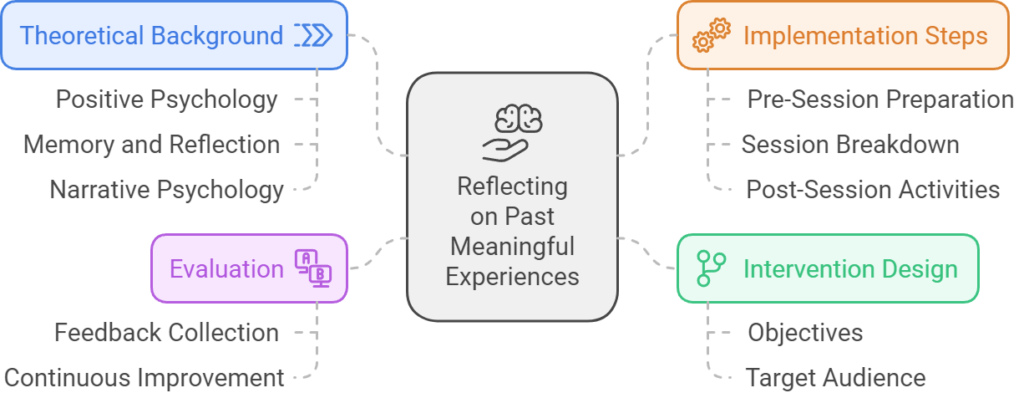Encourage individuals to reflect on past experiences that brought them a sense of purpose and meaning, and explore how these can be integrated or recreated in their current lives.
An intervention designed to encourage individuals to reflect on past experiences that brought them a sense of purpose and meaning, and to explore how these can be integrated or recreated in their current lives, is a powerful tool in the field of positive psychology. This intervention aims to help participants rediscover moments of joy, fulfillment, and significance from their past and use these insights to enhance their present and future well-being. The detailed description below outlines the theoretical foundations, practical steps, and considerations necessary to implement this intervention effectively.

Theoretical Background
Positive Psychology and Meaning
Positive psychology focuses on the strengths that enable individuals and communities to thrive. One of the core aspects of positive psychology is the pursuit of a meaningful life. Research suggests that reflecting on meaningful past experiences can boost individuals’ current sense of purpose and overall well-being.
Memory and Reflection
Memory plays a crucial role in how we perceive and shape our identities. Reflective practices allow individuals to revisit and reinterpret their past experiences, potentially leading to new insights and emotional outcomes. By reflecting on past meaningful experiences, individuals can reconnect with their core values and the emotions associated with those times.
Narrative Psychology
Narrative psychology posits that individuals construct their identities through stories. By recalling and narrating meaningful experiences, people can reshape their life stories in ways that emphasize growth, resilience, and fulfillment.
Intervention Design
Objectives
- To help participants identify and reflect on past experiences that were particularly meaningful.
- To enable participants to understand how these experiences contributed to their sense of purpose and identity.
- To explore ways to integrate the essence of these past experiences into their current life circumstances.
Target Audience
This intervention is suitable for adults across various life stages who are seeking to enhance their sense of meaning and purpose in life. It can be adapted for specific groups, such as elderly individuals, veterans, or those undergoing significant life transitions.
Implementation Steps
Pre-Session Preparation
- Recruitment and Screening: Participants are recruited through community centers, online platforms, and flyers. A screening process ensures that the intervention is appropriate for their psychological state.
- Materials Preparation: Develop and distribute journals or digital apps for reflection exercises. Prepare guidelines and prompts to aid the reflection process.
Session Breakdown
Session 1: Introduction to Reflective Practice
- Objective: Introduce the concept of meaningful experiences and reflective practice.
- Activities:
- Icebreaker activity to build rapport among participants.
- Workshop on the principles of positive psychology and narrative psychology.
- Introduction to the personal reflection journal.
Session 2: Identifying Meaningful Experiences
- Objective: Guide participants in identifying past experiences that brought them joy, satisfaction, and a sense of purpose.
- Activities:
- Guided meditation to facilitate deep reflection.
- Writing exercise: Participants list top five meaningful experiences.
- Group sharing session to discuss these experiences and their impact.
Session 3: Deep Dive into Past Experiences
- Objective: Encourage detailed reflection on the circumstances, emotions, and values associated with each identified experience.
- Activities:
- Participants choose one experience to explore in depth.
- Facilitated storytelling session where participants share their chosen experience and receive feedback.
- Reflective prompts to explore the underlying values and emotions.
Session 4: Integrating Experiences into Current Life
- Objective: Develop strategies to integrate the essence of these past experiences into current life situations.
- Activities:
- Group brainstorming to find practical ways to recreate or adapt the values and joy found in past experiences.
- Creation of a personal action plan.
- Commitment ceremony where participants share their plans with the group.
Post-Session Activities
- Follow-up: Arrange follow-up meetings or digital check-ins to discuss progress and challenges.
- Community Building: Encourage ongoing communication among participants through a dedicated online forum or regular meet-ups.
Evaluation and Adaptation
Feedback Collection
Gather feedback through structured questionnaires and informal discussions to assess the intervention’s impact on participants’ sense of meaning and well-being.
Continuous Improvement
Analyze feedback to refine the intervention. Adapt the approach based on different needs and cultural backgrounds of participants.
Conclusion
Reflecting on past meaningful experiences is a profound exercise that not only reconnects individuals to their past joys and achievements but also empowers them to integrate these elements into their present and future lives. This intervention, rooted in positive psychology, offers a structured yet flexible framework to facilitate this reflective process. By doing so, it aims to enhance participants’ overall quality of life, providing them with the tools to craft a fulfilling and purpose-driven existence.